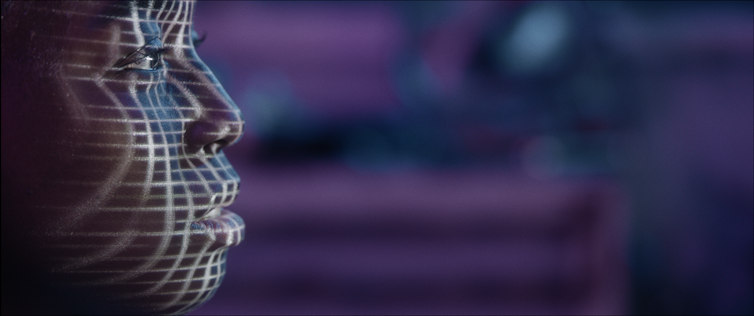Community, Leadership, Experimentation, Diversity, & Education
Pittsburgh Arts, Regional Theatre, New Work, Producing, Copyright, Labor Unions,
New Products, Coping Skills, J-O-Bs...
Theatre industry news, University & School of Drama Announcements, plus occasional course support for
Carnegie Mellon School of Drama Faculty, Staff, Students, and Alumni.
CMU School of Drama
Wednesday, March 22, 2023
Interactive cinema: how films could alter plotlines in real time by responding to viewers' emotions
theconversation.com: Most films offer exactly the same viewing experience. You sit down, the film starts, the plot unfolds and you are follow what’s happening on screen until the story concludes. It’s a linear experience. My new film, Before We Disappear – about a pair of climate activists who seek revenge on corporate perpetrators of global warming – seeks to alter that viewing experience.
Subscribe to:
Post Comments (Atom)

5 comments:
I think that this is definitely an interesting idea as it has the potential to revolutionize the way we experience movies, by providing a more personalized and engaging experience that adapts to the viewer's emotional state. However, I also recognize the importance of ethical considerations, such as ensuring that viewers have control over their emotions and that their privacy is respected. I feel a bit strange about engaging in this kind of technological advancements in cinema when I feel like it is a plot line in a Black Mirror episode. I understand that it is important to be flexible when it comes to new and emerging technologies but I can’t help my hesitancy. I do appreciate that they argue that careful consideration is needed to ensure that viewers have control over their emotional responses and that ethical guidelines are established to prevent any harm or exploitation of the audience as it is nice to know that the developers of the technology share some of my concerns.
This idea is absolutely wild to me. I wonder if this would be used to adapt films to audiences without the knowledge of the audience – so they would emerge not even knowing that they had had an outcome on the story. I can’t even begin to understand the technology that would make this happen; the sensitivity of the emotional reading and the ability to switch between so many varied scenes without disrupting the story seems at first glance impossible. I would be curious how audiences would react to knowing they are being so closely examined; personally, I would feel kind of uncomfortable, especially since when you’re watching a film you’re usually in the dark, not being witnessed. However, the technological implications are of course fascinating. The choose-your-own-adventure types of things, like the Netflix specials, are fun, but I kind of feel like some of the fun is in the intention – so if that’s taken away, I wonder if it just becomes creepy or what it would reveal about the subconscious.
Sometimes I think technology has gone too far. It is slightly terrifying to try and think of where it will end up by the end of my lifetime. Changing the plot of something in real time sounds like a lot of work on all ends. I am glad they are taking care of the ethical side of things to ensure that no one gets hurt. Sometimes when technology like this pops up it is moving too fast to even care about what it is doing to the people it interacts with. I think that if used responsibly that this technology could be really cool and the next step in entertainment. I would be lying if I said I wasn't scared of it though. But maybe that's because I don’t one hundred percent, understand how it works and maybe it is actually less scary than it seems. But I feel like this is one of the things we are warned about in sci-fi movies and stuff.
I watched Bandersnatch when it came out and I thought it was a fascinating and enjoyable way for a movie to work. This proposition for the step next for that technology is interesting - and like many other commenters I’m curious about the ethics surrounding this kind of technology. It seems like something that you would think would be developed and/or released in 10-20 years but from this article this technology might be here significantly sooner than that. I’d be interested to see what thoughts from the brain would be considered important when choosing what path a movie would take (you have to be able to film the whole thing). It’d be kind of funny to show up for an action movie only for your brain to decide you want to watch a chill version of it - like other commenters I’m not totally sure how that lack of intent would affect that experience. I’m sure filming and storyboarding these kinds of films would be challenging - we’ll see how this technology develops in the future.
The idea of being able to edit the content of a movie as it is happening seems like a really far-out concept technology-wise, however, I do hope that I am around to see something similar to this come to fruition. Being able to alter the course of a story could be something that really reflects role-play games, and other choose-your-own-adventure mediums, and I think that if some kind of technology allowed for this, there would be an extremely receptive audience. Especially with movies like “Dungeons and Dragons: Honor Among Thieves” that just came out this weekend, technology that allowed you to alter the course of the movie would bring a whole new element of immersion into a piece. However, as I said earlier, I find that we are decades, if not centuries away from any kind of technology like this taking shape in the media. It just seems too complex for our current capabilities, unless it took on some kind of visual-novel kind of programming.
Post a Comment